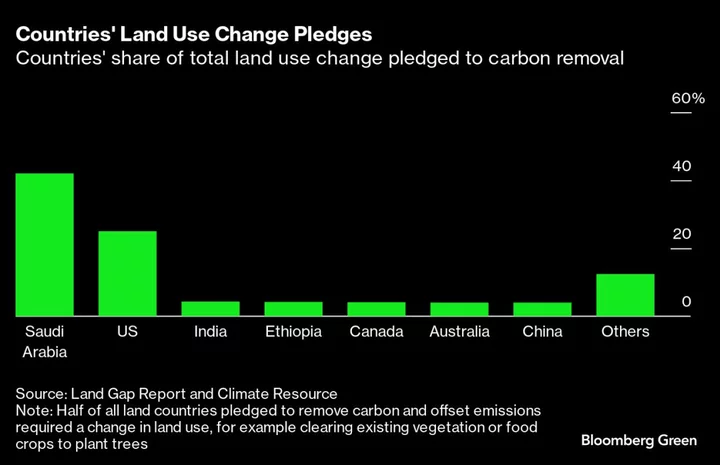More than 100 countries have pledged about 1 billion hectares (3.9 million square miles) of land — more than the continental United States — to restoring ecosystems and planting trees, an attempt to meet their climate targets that new research says is “unrealistic.”
The US, Saudi Arabia, Canada, Australia and other high-income countries made some of the largest land pledges, based on emissions-reduction plans submitted to the United Nations. By protecting nature and planting trees, countries say they will reduce the amount of CO2 in the atmosphere, lessening their overall emissions.
The study, conducted by a team of researchers at the University of Melbourne and Climate Resource, found more than 80% of land was pledged by just 10 countries, with scant details on which parcels of land might be used for carbon removal, and how. Half of all land pledges required a change in use, for example clearing existing vegetation or food crops to grow bioenergy crops or plant trees. Two countries, Saudi Arabia and the US, accounted for two-thirds of these kinds of plans.
Not good, said Kate Dooley, a research fellow at the University of Melbourne who led the project to look at how much land governments would need to meet their net-zero targets. “These are all countries that should be betting on reducing emissions, not pledging large areas of land,” Dooley said in an interview.
To arrive at their estimate of 1 billion hectares, researchers combed through the pledges submitted by countries to the UN. Some countries gave details on how many hectares of land they portioned out for tree planting and ecosystem restoration. Others had goals to offset a specific amount of carbon through such activities, which the researchers used to estimate the amount of land that would be needed.
Such large requirements combined with vague, opaque plans “should raise red flags,” Dooley said.“It’s not very realistic,” she added. “Where is this land, can they use it for climate mitigation, and can we trust these targets that rely on so much land?”
The study comes weeks before the UN-sponsored Conference of the Parties, or COP, where the topic of land-based carbon removal will be discussed among other climate issues. Negotiators from different nations are set to gather in Dubai to work out international rules for trading carbon credits, including agreements between countries that would allow one country to use another country’s land to generate carbon credits and offset emissions.
Read more: Carbon Market Faces Chaos as African Mega-Project Collapses

